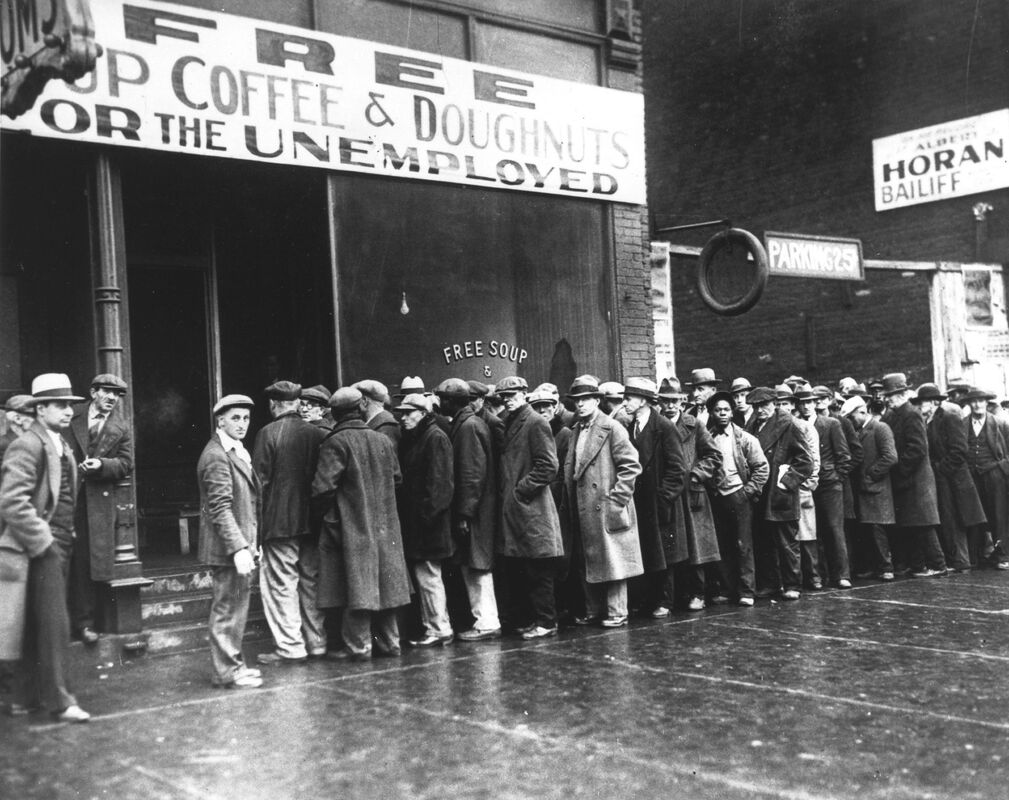WWI ended in 1918, and as usual our post-war economy began taking off. The "Roaring 20's," kicked in and there was more discretionary spending as more women began going into the workplace. They proved they were very capable of handling things here at home during the war. Two career families were born.
When radio kicked in around 1920, people were finding out about products they'd never heard of before, and many had money to spend. The advertising was effective because people began looking for ways to get the cool things they wanted, "before," they had the money to purchase them. Next thing we know, banks are jumping in and providing cash galore so people could buy things via credit.
The stock market began getting major injections of cash from mostly people who had never invested before. There was a huge push by brokers in New York City, to get people investing and some of them were making wild claims about the potential returns (a lot of what they did is illegal now). They made it sound like getting rich via the market was a slam dunk, so some investors were borrowing money from banks, to buy stock. A recipe for disaster.
At first it was awesome for investors because the U.S. economy doubled in the 1920's. Stocks were up around 218% during this period so word of mouth on the success of putting a person's money in the stock market turned some people on like lottery junkies. Inevitably, when a market takes off (Bull Run), it will come back down. The hope is that it doesn't drop at an alarming rate or investors could get scared and start selling off their portfolios causing the market to crash. The banks and the Fed were worried there might be too much hope in our economy. They felt there was no way it could sustain its growth; especially since it was mostly due to borrowed money.
So, the Fed Chairman began raising interests' rates in hopes of getting people to slow down on their borrowing. It was too little too late. And since there wasn't an internet back then to let people know what was happening, word slowly made its way out that many of the investment firms were selling off their stocks, because unlike everyone else, they knew companies being traded on the market were struggling because brokers had access to their financial data.
They were attempting to liquify as much as possible for themselves and their high-powered clients, before the masses knew what hit them. Every day the market was crashing and those left holding the bag pretty much received ten cents for every dollar they invested. It took a while for the market to recover from this terrible character stain.
Businesses were struggling for a variety of reasons and among them was that consumers had much less money to spend and what they did have, they were pretty much burying in the backyard; a lot of people were afraid of banks at this point. Consumer confidence had bottomed out. People weren't buying wants at this point; they were buying needs.
Then the usual economic indicators went south as unemployment reached a record high that has still not been beaten (24.9%), and inflation reared its very ugly head. Banks were struggling lending money because money wasn't coming in from private citizens nor local businesses, and the Federal Reserve Bank was getting very strict as to who they'd let borrow and for how much. Money tightened.
Keep in mind, banks borrow money as well. As people were struggling to pay their debts, the banks were left holding the bag. At this point homelessness became rampant and crime was going through the roof because people were desperate. Food riots were breaking out as if we were a third-world country.
As we know, thanks to our awesome history teachers, President Franklin D. Roosevelt, took on the challenge of getting people out of poverty through his "New Deal." He established social programs to help the downtrodden. He established agencies such as the FDIC and The Securities and Exchange Commission, to provide consumers with better protection.
The problem is that what was supposed to be a band-aid fix to get our country through The Great Depression, became programs in the federal budget. It's what they do.


 RSS Feed
RSS Feed